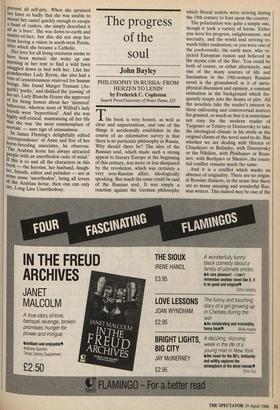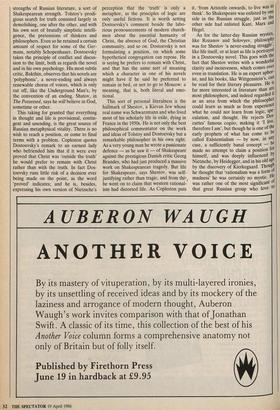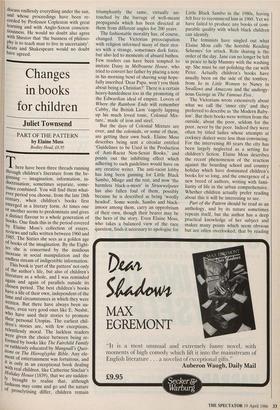The progress of the soul
John Bayley
PHILOSOPHY IN RUSSIA: FROM HERZEN TO LENIN by Frederick C. Copleston
Search Press/University of Notre Dame, f25
This book is very honest, as well as clear and unpretentious, and one of the things it accidentally establishes in the course of an informative survey is that there is no particular philosophy in Russia. Why should there be? The idea of the Russian soul, which made such a strong appeal to literary Europe at the beginning of this century, was more or less dissipated by the revolution, which was certainly a very non-Russian affair, ideologically speaking. But much the same could be said of the Russian soul. It was simply a reaction against the German philosophy
which liberal zealots were striving during the 19th century to foist upon the country.
The polarisation was quite a simple one, though it took a variety of forms. Either you were for progress, enlightenment, and necessity, and the world soul striving to- wards fuller realisation; or you were one of the pochvenniki, the earth men, who re- jected European reason and believed in the mystic role of the Slay. You could be both of course, or either alternately, and one of the many sources of life and fascination in the 19th-century Russian novel is the groundswell in it of meta- physical discussion and opinion, a constant animation in the background which fre- quently erupts into the drama or plot. All the novelists take the reader's interest in these enlivening and controversial matters for granted, so much so that it is sometimes not easy for the modern reader of Turgenev or Tolstoy or Dostoevsky to take the ideological climate in his stride as the original clients of the novel used to do. But whether we are dealing with Herzen or Chaadayev or Belinsky, with Dostoevsky or the Nihilists, with Plekhanov or Roza- nov, with Berdyaev or Shestov, the essen- tial conflict remains much the same.
And it is a conflict which masks an absence of originality. There are no origin- al Russian thinkers, in the sense that there are so many amazing and wonderful Rus- sian writers. This indeed may be one of the
strengths of Russian literature, a sort of Shakespearean strength. Tolstoy's prodi- gious search for truth consisted largely in demolishing, one after the other, and with his own sort of brutally simplistic intelli- gence, the pretensions of thinkers and philosophers. Even so he retained a certain amount of respect for some of the Ger- mans, notably Schopenhauer. Dostoevsky takes the principle of conflict and discus- sion to the limit, both as regards the novel and in his own psychology. His most subtle critic, Bakthin, observes that his novels are `polyphonic', a never-ending and always renewable chorus of voices, which is only cut off, like the Underground Man's, by the convention of an ending. Shatov, in The Possessed, says he will believe in God, sometime or other.
This taking for granted that everything in thought and life is provisional, contin- gent and unending, is the great source of Russian metaphysical vitality. There is no wish to reach a position, or come to final terms with a problem. Copleston quotes Dostoevsky's remark to an earnest lady who befriended him that if it were ever proved that Christ was 'outside the truth' he would prefer to remain with Christ rather than with the truth. In fact Dos- toevsky runs little risk of a decision ever being made on the point, as the word `proved' indicates; and he is, besides, expressing his own version of Nietzsche's perception that the 'truth' is only a metaphor, as the principles of logic are only useful fictions. It is worth setting Dostoevsky's comment beside the labo- rious pronouncements of modern church- men about the essential humanity of Christ, the absence of God, the Christian community, and so on. Dostoevsky is not formulating a position, on which some hypothetical congregation can repose. He is saying he prefers to remain with Christ, and that has the same sort of meaning which a character in one of his novels might have if he said he preferred to remain in bed, or not to go to Moscow: a meaning, that is, both literal and emo- tional.
This sort of personal literalness is the hallmark of Shestov, a Kievan Jew whose real name was Schwarzmann and who lived most of his scholarly life in exile, dying in France in the 1950s. He is not only the best philosophical commentator on the work and ideas of Tolstoy and Dostoevsky but a remarkable philosopher in his own right. As a very young man he wrote a passionate defence — as he saw it — of Shakespeare against the prestigious Danish critic Georg Brandes, who had just produced a massive work on Shakespearean tragedy. But life for Shakespeare, says Shestov, was self- justifying rather than tragic, and from thic1 he went on to claim that western rational- ism had distorted life. As Copleston puts
it, 'from Aristotle onwards, to live was to think'. So Shakespeare was enlisted by one side in the Russian struggle, just as the other side had enlisted Kant, Marx and Hegel.
As for the latter-day Russian mystics, like Rozanov and Solovyev, philosophy was for Shestov 'a never-ending struggle like life itself, or at least as life is portrayed in a Dostoevsky novel. This goes with the fact that Shestov writes with a wonderful clarity and incisiveness, which comes over even in translation. He is an expert aphor- ist, and his books, like Wittgenstein's, can be read for their literary pleasures. He is far more interested in literature than are most philosophers, and indeed regarded It as an area from which the philosopher could learn as much as from experience what he could not learn from logic, spe- culation, and thought. He rejects Des- cartes' famous cogito, making it live, therefore I am', but though he is one of the early prophets of what has come to be called Existentialism — by now, in any case, a sufficiently banal concept — he made no attempt to claim a position for himself, and was deeply influenced by Nietzsche, by Heidegger, and in his old age by the discovery of Kierkegaard. Though, he thought that 'rationalism was a form 0' madness' he was certainly no mystic. He was rather one of the most significant of that great Russian group who love to discuss endlessly everything under the sun, and whose proceedings have been re- corded by Professor Copleston with great learning and with Anglo-Saxon conscien- tiousness. He would no doubt also agree with Shestov that 'the business of philoso- phy is to teach man to live in uncertainty'. Keats and Shakespeare would no doubt have agreed.




















































 Previous page
Previous page